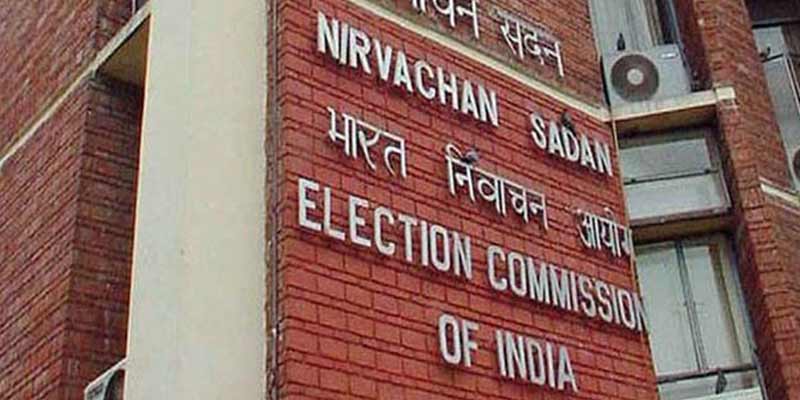- India
- Oct 04
EC names Pankaj Tripathi as ‘national icon’
• Actor Pankaj Tripathi was made the ‘national icon’ of Election Commission of India. Tripathi, who was already EC state icon, was chosen for his association with EC in creating awareness amongst voters. Chief Election Commissioner Rajiv Kumar said the decision to make him the national icon was done keeping in view his commitment to the cause and wide appeal across the country.
• CEC Rajiv Kumar and Election Commissioner Anup Chandra Pandey launched a yearlong voter awareness programme - ‘Matdata Junction’ during the event organised at Akashvani Rang Bhavan, New Delhi.
• The ‘Matdata Junction’ is a 52-episode radio series produced by the Election Commission of India, in collaboration with All India Radio.
• Fifty-two episodes, each 15 minutes long, will be broadcast every Friday on Vividh Bharati stations and various radio stations of the All India Radio in 23 languages.
• The first episode of ‘Matdata Junction’ will be aired on October 7.
• Kumar said the programme will be a strong platform to connect with voters across the country.
• The programme as a combination of information and entertainment, would specifically help address urban apathy and inform the audience about the election processes in the conduct of free, fair, transparent, inducement free, accessible and inclusive elections in an interactive communication format.
Election Commission of India
• Elections in India are covered under Part XV of the Indian Constitution, which includes Articles 324 to 329.
• The Election Commission of India (EC) is a permanent independent constitutional body created under Article 324 of the Indian Constitution.
• The EC was set up on January 25, 1950, on the eve of India becoming a sovereign democratic republic with its headquarters in New Delhi.
• EC is vested with the powers and responsibilities of superintendence, direction and control of the entire process of preparation and revision of electoral rolls for, and conduct of, elections to the houses of Parliament and Legislatures of the states and the Union Territories and of elections to the offices of President and Vice-President.
• Elections are conducted according to the constitutional provisions, supplemented by laws made by Parliament and rules and orders made thereunder. The major laws are:
• The Presidential and Vice-Presidential Elections Act, 1952.
• The Representation of the People Act, 1950.
• The Representation of the People Act, 1951.
• EC prepares, maintains and periodically updates (new registration, modification and deletion as per guidelines) the electoral rolls, registers political parties/candidates, supervises the whole process of conducting election, monitors the election campaigns, including funding and expenditure of candidates, maintaining Model Code of Conduct (MCC) to make the entire electoral process free fair democratic and accessible for all its stakeholders.
• It also facilitates coverage of the election process by the media, carries out the voter education and awareness measures, organises the polling stations/ booths where voting takes place, and oversees under stringent surveillance mechanisms the counting of votes and the declaration of results.
• All political parties are required to get themselves registered with the Election Commission. Based on performance criteria laid down in the Election Symbols (Reservation & Allotment) Order 1968, the EC grants recognition to political parties as national or state parties. It also decides disputes relating to splits/mergers of recognised political parties.
• At the state level, the election work is supervised, subject to overall superintendence, direction and control of the Commission, by the Chief Electoral Officer of the State, who is appointed by the Commission from amongst senior civil servants proposed by the concerned state government. He is, in most of the States, a full time officer and has a small team of supporting staff.
Election Commissioners
• The first Chief Election Commissioner (Sukumar Sen) was appointed on March 21, 1950.
• Originally, the commission had only a Chief Election Commissioner. It currently consists of the Chief Election Commissioner and two Election Commissioners.
• The concept of multi-member Commission has been in operation since 1993, with decision making power by majority vote.
• The President appoints Chief Election Commissioner and Election Commissioners.
• They have tenure of six years, or up to the age of 65 years, whichever is earlier.
• They enjoy the same status and receive salary and perks as available to judges of the Supreme Court of India.
• The Chief Election Commissioner can be removed from office only through impeachment by Parliament.
Powers and functions of EC can be summarised as:
• Determine the territorial areas of the electoral constituencies throughout the country on the basis of the Delimitation Commission Act of Parliament.
• Prepare and periodically revise electoral rolls and to register all eligible voters.
• Notify the dates and schedules of elections and to scrutinize nomination papers.
• Grant recognition to political parties and allot election symbols to them.
• Act as a court for settling disputes related to granting of recognition to political parties and allotment of election symbols to them.
• Appoint officers for inquiring into disputes relating to electoral arrangements.
• Determine the code of conduct to be observed by the parties and the candidates at the time of elections.
• Prepare a roster for publicity of the policies of the political parties on radio and TV in times of elections.
• Advise the President on matters relating to the disqualifications of the members of Parliament.
• Advise the governor on matters relating to the disqualifications of the members of the state legislature.
• Cancel voting in the event of rigging, booth capturing, violence and other irregularities.
• Supervise the machinery of elections throughout the country to ensure free and fair elections.
Manorama Yearbook app is now available on Google Play Store and iOS App Store


